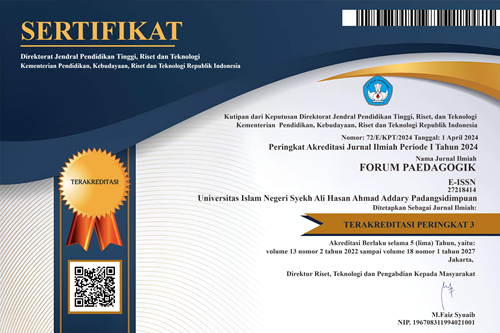VALUES OF JAVA CULTURE
Research on the moral values of Javanese culture needs to be done because this study it will reveal and explain various kinds of Javanese culture, especially the culture which has moral values in it. For some people, culture is only a tradition left by their ancestors, then passed down from generation to generation, and needs to be preserved. Yet every Javanese culture has its own history, meaning, and value. This study uses a qualitative descriptive analysis method. The approach used is the library research approach or the library method. Javanese culture is a culture originating from Java. If we go back to history, of course, Javanese culture is not far from the influence of Hinduism, animism, and dynamism. Some Javanese cultures that still exist today are used by the community: salametan, tedak siten, wayang, manners, bancaan weton, politeness, and many more. Among all Javanese cultures, some of them have moral values. This is what needs to be applied and maintained by every parent in educating children's morals. Besides introducing Javanese culture to children. Parents have invited their children to maintain Javanese culture through Javanese cultural moral values. By implementing character education through Javanese culture, then we have preserved Javanese culture and practiced moral values in it in everyday life.
Keywords : morals; culture; java
Adriana, I. (2011). Neloni, Mitoni or Tingkeban: (a combination of Javanese traditions and Muslim community rituals). Cars, 19.
Anggrayni, NT (2016). Character Education Based on Local Wisdom of Javanese Culture.
Apriliani, EI, & Dewi, NK (2019). Javanese Cultural Manners Form Early Childhood Polite Attitudes. Indonesian Journal of Early Childhood: World Journal of Early Childhood, 1(1), 28.
Arafik, M., & Rumidjan, R. (2016). Profile of Upload-Uploading Javanese Learning in Elementary Schools. Elementary Schools, Studies of Educational Theory and Practice, 25(1), 55–61.
Bakri, S. (2014). Javanese Islamic Culture (Islamic Adaptation in Javanese Culture). Dinika, 12(2), 33–40.
Darmoko. (2016). Javanese Culture in Diaspora: An Overview of Javanese Society in Suriname. Journal of IKADBUDI, 5.
Djaya, TR (2020). The Meaning of the Tedhak Siten Tradition in the Kendal Community: Journal of Economics, Social & Humanities, 01(06), 21–31.
Hafidzi, A. (2020). Educational Values of Optimism in the Tedhak Siten Tradition in Javanese Society Optimism Educational Values in the Tedhak Siten Tradition in Javanese Society. Journal of Education, Humanities and Social Sciences (JEHSS), 3(2), 442–451.
Huda, N. (2020). Construction of Javanese Moral and Moral Relations in Basic Education: Philosophical Studies at MI Unggulan Sabilillah and SD N Jubellor, Lamongan. 30(2), 85–102.
Kholil, A. (2009). Religion and the Slametan Ritual: Anthropological Description of Javanese Society's Diversity. El-HARAKAH (ACCREDITED), 1(1), 84–98.
Mustika. D. Indrayani. (2013). Javanese culture as a vehicle for children's moral education. Journal of PPKn Study Program, 2.
Nurgiyantoro, B. (2011). Wayang and National Character Development. Journal of Character Education, 18–34.
Prasasti, S. (2020). Indigenous Counseling: Exploring Local Wisdom Values of the Alms of the Earth Tradition in Javanese Culture. Journal of Chemical Information and Modeling, 14(02), 110–123.
Purwaningrum, S., & Ismail, H. (2019). Acculturation of Islam with Javanese Culture: Folklore Studies of the Telonan and Tingkeban Traditions in Kediri, East Java. Fikri : Journal of Religious, Social and Cultural Studies, 4(1), 31–42.
Putri, WTA, & Nasyiithoh, HK (2019). Packaging Javanese ungguh and moral values in early childhood education based on the Charlotte Mason paradigm. Annual Conference for Muslim Scholars, 456–464.
Putu Budiyasa, IDG (2018). Intercultural Communication in Culture and Language Manners. Widya Duta: Scientific Journal of Religion and Socio-Cultural Sciences, 13(1), 11.
Rachim, RL, & Nashori, HF (2007). Javanese cultural values and naughty behavior of Javanese teenagers. Periodic Scientific Journal of Psychology, 09(1), 30–43.
Rina Devianty. (2017). Language as a Mirror of Culture. Journal of Tarbiyah, 24(2), 226–245.
Sukmawan Wisnu Pradanta, Sudardi Bani, SS (2015). Study of Javanese Cultural Values in the Bancaa An Weton Tradition in Surakarta City (A Study of Symbolism in Javanese Culture). LINGUA, 12(2), 155–172.
Sumlah, U. (2012). Javanese Islam and Cultural Acculturation : El Harakah, 14(1), 51–68.
Umar, MT (2020). Islam in Javanese Culture Perspective of the Qur'an. IBDA: Journal of Islamic and Cultural Studies, 18(1), 68–86. https://doi.org/10.24090/ibda.v18i1.3473
 Copyright (c) 2022 Elvian Mutiara, Yazida Ichsan, Ismail Fauzi, Husein Ma'ruf
Copyright (c) 2022 Elvian Mutiara, Yazida Ichsan, Ismail Fauzi, Husein Ma'ruf

This work is licensed under a Creative Commons Attribution-ShareAlike 4.0 International License.











